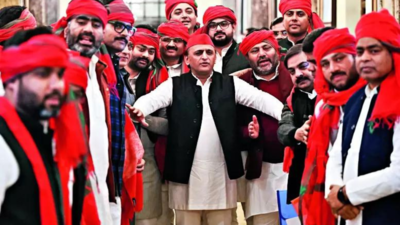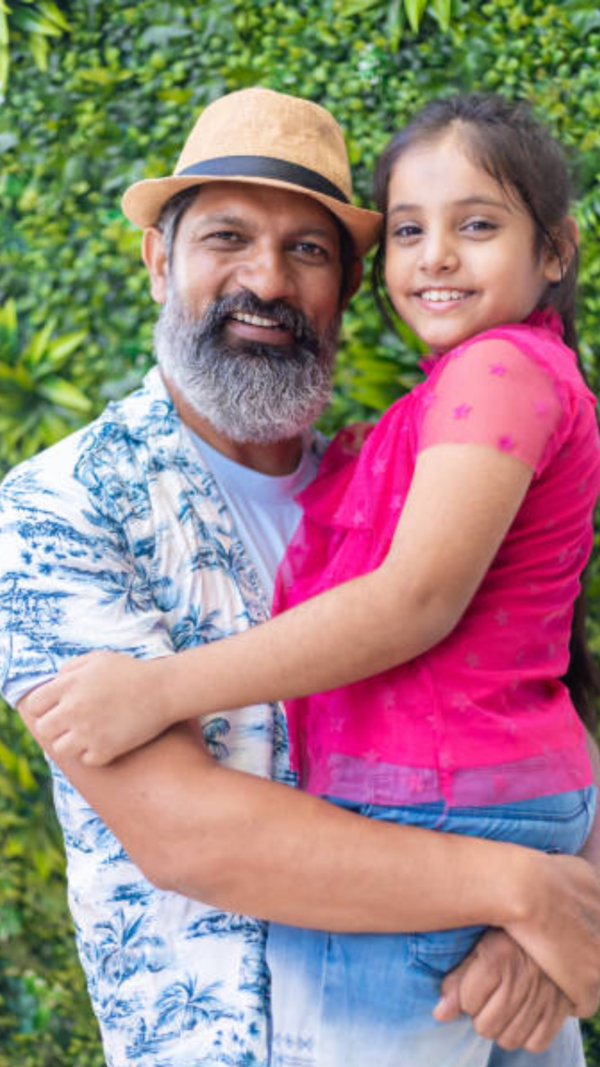- News
- City News
- lucknow News
- Akhilesh Yadav takes a step ‘Backward’ to move forward and beyond Mayawati
Trending
Akhilesh Yadav takes a step ‘Backward’ to move forward and beyond Mayawati
SP's 'social engineering' strategy united Dalits, specifically Jatavs, breaking traditional voting patterns in UP.

Akhilesh’s new-found ‘social engineering’ managed to win over Dalits in general and Jatavs in particular who were, till now, seen as traditional BSP voters
LUCKNOW: Samajwadi Party chief Akhilesh Yadav had got off to a good start. His early emphasis on ‘Pichde (backward), Dalit, Alpasankhyak (minorities)’ was combined with a sharp focus on farmer issues, joblessness, paper leaks and rising prices. It turned out to be one of his best election strategies, backed by intelligent candidate selection.
The Samajwadi Party has impressively led the INDIA bloc charge in UP winning 37 of the 62 seats it contested, its best showing in the state in a general election.The PDA formulation, in particular, became a unifying force. The highlight of this newfound “social engineering” was that the party managed to win over Dalits in general and Jatavs in particular who were, till now, seen as traditional BSP voters.
This election has also shattered the hypothesis that Dalits and Yadavs can never unite in UP. As per caste assessments based on exit polls, 65% of Scheduled Caste votes polled went to the SP — an increase of 21% as compared to 2019 polls. Of these, 32% of Jatav votes polled went to SP though they have traditionally been committed voters of BSP. The shift was not only from the BSP to SP.
SP strategists insist that the jump in Dalit voters was more than what was visible in 2019 Lok Sabha polls. “In 2019, SP had contested elections in alliance with the BSP. So it was no surprise that Dalits voted for our party. This time we contested against BSP and got an overwhelming response from the Dalit community,” said a senior SP functionary.
Wooing Dalits & non-Yadav OBCs
After the 2019 LS alliance between SP and BSP, when Mayawati had walked away with 10 seats and Akhilesh was left with 5, it was evident that vote transfer between SP and its ally was a one-way street. The SP leadership felt cheated. Party strate gists then shifted their focus to Dalit leaders with whom the party was already in touch.
Former BSP minister Ghura Ram, a founding member, was the first big dalit leader to switch loyalties to SP. Soon after, more joined Akhilesh. The SP did not only pick senior leaders. Regional coordinators, former ministers and other officebearers of BSP joined the exodus. Akhilesh made it a point to ensure that in press meets he was accompanied by Dalit leaders.
He decided to rope in non-Yadav OBCs as well. By Oct 2021, prominent backward BSP leaders like sitting MLAs Lalji Verma and Ramachal Rajbhar were with SP. The focus on non-Yadav OBCs was aptly reflected in the appointment of his party’s national executive in 2023. Of 62 members in the committee, around 40% were ‘non-Yadav’ OBCs and hailed from electorally influential communities like Kurmi, Rajbhar and Nishads. The list also included six members who were Dalits.
The blowback
As expected, the focus on Dalits and Non-Yadav OBCs left upper caste, Yadav and Muslim functionaries uncomfortable. Those eyeing tickets for 2024 Lok Sabha polls and those offered better deals by BJP were the first ones to snap. But that did not deter Akhilesh from giving tickets as per his PDA formula to all castes and communities.
At least 14 candidates were exBSP. In fact, Akhilesh shed the image of the SP being an M-Y party by giving the least number of tickets to Muslims and Yadavs in the party’s history. “Of course, it was all done after taking community leaders into confidence, explaining to them how a large number of Muslim and Yadav candidates help BJP’s bid for counter-polarisation,” said an analyst.
For SP strategists, the final highlight was a bunch of victories from unlikely quarters like Faizabad, which it had last won in 1998. “The victory of Awadesh Prasad and the tough fight that Sunita Verma put up against BJP is important as it exposes BJP’s attempt to use religion for political gains,” said a senior SP functionary. Two other important victories for SP came from Rampur and Moradabad—seats which have the maximum Muslim population.
The Samajwadi Party has impressively led the INDIA bloc charge in UP winning 37 of the 62 seats it contested, its best showing in the state in a general election.The PDA formulation, in particular, became a unifying force. The highlight of this newfound “social engineering” was that the party managed to win over Dalits in general and Jatavs in particular who were, till now, seen as traditional BSP voters.
This election has also shattered the hypothesis that Dalits and Yadavs can never unite in UP. As per caste assessments based on exit polls, 65% of Scheduled Caste votes polled went to the SP — an increase of 21% as compared to 2019 polls. Of these, 32% of Jatav votes polled went to SP though they have traditionally been committed voters of BSP. The shift was not only from the BSP to SP.
SP strategists insist that the jump in Dalit voters was more than what was visible in 2019 Lok Sabha polls. “In 2019, SP had contested elections in alliance with the BSP. So it was no surprise that Dalits voted for our party. This time we contested against BSP and got an overwhelming response from the Dalit community,” said a senior SP functionary.
Apart from the PDA pitch, Akhilesh succeeded in turning ‘Abki baar 400 paar’ into a ‘Save the Constitution’ narrative. He was among the first to say that the BJP wanted 400-plus seats to change the Constitution and end reservation for Dalits and backwards. This worked to bind together jobless youths and families from Dalit and backward segments.
Wooing Dalits & non-Yadav OBCs
After the 2019 LS alliance between SP and BSP, when Mayawati had walked away with 10 seats and Akhilesh was left with 5, it was evident that vote transfer between SP and its ally was a one-way street. The SP leadership felt cheated. Party strate gists then shifted their focus to Dalit leaders with whom the party was already in touch.
Former BSP minister Ghura Ram, a founding member, was the first big dalit leader to switch loyalties to SP. Soon after, more joined Akhilesh. The SP did not only pick senior leaders. Regional coordinators, former ministers and other officebearers of BSP joined the exodus. Akhilesh made it a point to ensure that in press meets he was accompanied by Dalit leaders.
He decided to rope in non-Yadav OBCs as well. By Oct 2021, prominent backward BSP leaders like sitting MLAs Lalji Verma and Ramachal Rajbhar were with SP. The focus on non-Yadav OBCs was aptly reflected in the appointment of his party’s national executive in 2023. Of 62 members in the committee, around 40% were ‘non-Yadav’ OBCs and hailed from electorally influential communities like Kurmi, Rajbhar and Nishads. The list also included six members who were Dalits.
The blowback
As expected, the focus on Dalits and Non-Yadav OBCs left upper caste, Yadav and Muslim functionaries uncomfortable. Those eyeing tickets for 2024 Lok Sabha polls and those offered better deals by BJP were the first ones to snap. But that did not deter Akhilesh from giving tickets as per his PDA formula to all castes and communities.
At least 14 candidates were exBSP. In fact, Akhilesh shed the image of the SP being an M-Y party by giving the least number of tickets to Muslims and Yadavs in the party’s history. “Of course, it was all done after taking community leaders into confidence, explaining to them how a large number of Muslim and Yadav candidates help BJP’s bid for counter-polarisation,” said an analyst.
For SP strategists, the final highlight was a bunch of victories from unlikely quarters like Faizabad, which it had last won in 1998. “The victory of Awadesh Prasad and the tough fight that Sunita Verma put up against BJP is important as it exposes BJP’s attempt to use religion for political gains,” said a senior SP functionary. Two other important victories for SP came from Rampur and Moradabad—seats which have the maximum Muslim population.
End of Article
FOLLOW US ON SOCIAL MEDIA










